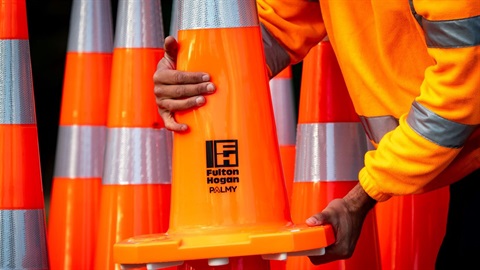Road maintenance contract review
Published on 12 January 2024

In 2023, elected members undertook an external review of our road maintenance contract with Fulton Hogan. A summary of the review was presented at a Council meeting on 6 September and is outlined below.
Fulton Hogan was awarded the road maintenance contract for Palmerston North in 2021, a contract worth $38 million over three years that is negotiated every three years.
Our city’s road maintenance contract includes a wide range of responsibilities to ensure our roads are safe for everyone, which includes things like road and footpath repairs, street cleaning, signage, line marking, traffic signals, streetlights, drainage, vegetation control, and responding to weather damage.
Review aimed to identify challenges and recommend improvements
Last year, on 17 August, our elected members decided an external review of the contract was required to identify some of the wider challenges causing deterioration to the city’s road network, as well as recommend some potential short and long-term solutions for improvement. The review looked at the strategy and procurement process before the contract and whether the contract and service delivery were working as anticipated. It also considered the impact of weather events, budgeting and the existing condition of the road network.
The review – undertaken by the Building Intelligence Group – highlighted it was common for contracts to be reviewed at this stage (a similar review was undertaken at the same stage of the previous road maintenance contract with Higgins). They often have an initial three-year term, which is spent on building the foundations for success, with renewal options to encourage good performance.
We remain committed to working with Fulton Hogan
The review recommended retaining the contract with Fulton Hogan. It acknowledged there are aspects of the contract that work well and some aspects that need rescoping. The review highlighted ways in which Council staff and Fulton Hogan could work more collaboratively, focus on proactive asset management, and remove some low-value activities from the contract that are causing difficulties.
We are committed to working with Fulton Hogan and our Mayor, Chief Executive and Chief Infrastructure Officer have met with their national and regional leadership teams to discuss the review. Several workshops are planned with them over the coming months to support the implementation of the recommendations outlined in the review.
Summary of the key findings
Establishing the contract
The review suggested staff turnover at Council when the contract moved from Higgins to Fulton Hogan led to a lack of continuity as the contract started. It also found Fulton Hogan also struggled to resource the contract initially due to the Covid-19 pandemic, as well as national and regional workforce shortages which made it difficult to establish a new regional base in Palmerston North.
Improve collaboration
The review found the existing relationship supported written communication and that the two parties should meet more in-person via co-location, more face-to-face communication, culture workshops or developing a better process for how problems will be solved or escalated.
Revise contract scope
The review highlighted some subcontracted activities that were not performing as expected under the existing contract, such as streetlight maintenance and road sweeping. Separating these services from the contract would allow Council to bring them in-house and have direct control over how they are provided and managed, and allow Fulton Hogan to focus on delivering its core network maintenance.
Service delivery
The review found some programmed work was not completed within the allocated months. These jobs would be carried into future monthly work programmes, creating budgeting issues. The review stated that both parties should be more transparent in proactively communicating issues that could affect delivery, such as budgeting, resourcing or equipment problems.
Budget and asset management approach
The review noted the current approach to managing our city’s roads is reactive, with complaints from the public driving the work programming and spending. Many of these activities, such as pothole repairs, are temporary and do not fix the underlying issues causing failures to the road surface.
These issues are compounded by budget shortfalls. For example, emergency work caused by extreme weather events is currently funded through existing budgets, which are already stretched by contract inflation fluctuations. These fluctuations are also unfunded and currently exceed 20 per cent of the total value of the contract. The impact is a reduction in the available budget to renew and maintain the road network.
Review found the general condition of our roads meets NZ Transport Agency standards
Despite these challenges, the review found the general condition of roads in Palmy met the applicable standards set by NZ Transport Agency Waka Kotahi and that we are performing better than other councils on most classes of road.
The review recommends we work alongside Fulton Hogan to develop and agree to a short-term asset management plan, as well as gain a collective understanding of the budgeting process and constraints. Roading budgets will be reviewed as part of the upcoming Long Term Plan process and we’ll continue to work with Waka-Kotahi funding cycles to prioritise work programmes and co-funding.
We will work together to balance what we can afford to repair with the maintenance needed to keep our roads safe
We agree with the findings and recommendations outlined in the report and remain committed to working with Fulton Hogan on a more transparent and collaborative relationship going forward. We accept there is currently an imbalance between what we can afford to repair and what the network requires, but we are committed to working towards a joint solution where the maintenance effort is balanced against the deterioration of the network.
Transport is the lifeblood of our city and we know it’s important our roads continue to move people and goods safely, as well as drive our local economy.